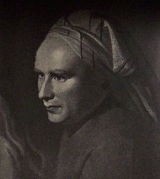
was an English poet
and hymnodist. One of the most popular poets of his time, Cowper changed the direction of 18th century nature poetry by writing of everyday life and scenes of the English countryside. In many ways, he was one of the forerunners of Romantic poetry
. Samuel Taylor Coleridge
called him "the best modern poet", whilst William Wordsworth
particularly admired his poem Yardley-Oak. He was a nephew of the poet Judith Madan
.
While Cowper found refuge in a fervent evangelical
Christianity
, the inspiration behind his much-loved hymns, he often experienced doubt
and feared that he was doomed to eternal damnation.
Absence from whom we love is worse than death, And frustrate hope severer than despair.![]()
But oars alone can ne'er prevail To reach the distant coast; The breath of Heaven must swell the sail, Or all the toil is lost. ![]()
Reasoning at every step he treads, Man yet mistakes his way, While meaner things, whom instinct leads, Are rarely known to stray. ![]()
Fate steals along with silent tread, Found oftenest in what least we dread, Frowns in the storm with angry brow, But in the sunshine strikes the blow. ![]()
True Charity, a plant divinely nurs'd. ![]()
"Regions Caesar never knew Thy posterity shall sway; Where his eagles never flew, None invincible as they." Such the bard's prophetic words, Pregnant with celestial fire, Bending as he swept the chords Of his sweet but awful lyre.![]()
Sweet stream that winds through yonder glade, Apt emblem of a virtuous maid Silent and chaste she steals along, Far from the world's gay busy throng: With gentle yet prevailing force, Intent upon her destined course; Graceful and useful all she does, Blessing and blest where'er she goes; Pure-bosom'd as that watery glass, And Heaven reflected in her face.![]()
Candid, and generous, and just,Boys care but little whom they trust,An error soon corrected— For who but learns in riper yearsThat man, when smoothest he appearsIs most to be suspected?![]()
Thus neither the praise nor the blame is our own. ![]()
I believe no man was ever scolded out of his sins.![]()

